|
|
|
Sort Order |
|
|
|
Items / Page
|
|
|
|
|
|
|
| Srl | Item |
| 1 |
ID:
192512
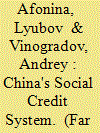

|
|
|
|
|
| Summary/Abstract |
China's nationwide social credit system (also called social rating system) aims to collect and analyze data on companies and individuals to assess their economic and social influence, civic qualities, responsibility, and financial reliability. The digital deterrence system for regulating public life appears to be a continuation of the Chinese social experiments of the second half of the 20th century. This time, however, social engineering uses previously unknown technical means free from the disadvantages of subjective evaluation and application under set parameters. Digitalization has thus provided another tool for assessing social behavior - an additional control system based on strict mathematical principles and, importantly, unlike legal systems, operating in real time. In terms of its regulatory function, it is comparable to ethnical norms and morality.
|
|
|
|
|
|
|
|
|
|
|
|
|
|
|
|
| 2 |
ID:
177171
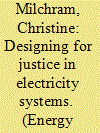

|
|
|
|
|
| Summary/Abstract |
In future urban energy systems, smart grid systems will be crucial for the integration of renewable energy. However, their deployment has moral implications, for example regarding data privacy, user autonomy, or distribution of responsibilities. ‘Energy justice’ is one of the most comprehensive frameworks to address these implications, but remains limited regarding smart grids, and regarding concrete guidelines for designers and policymakers. In this paper, we fill this gap by answering the following research question: How do design choices in smart grid projects impact energy justice? Thereby, four smart grid pilot projects are evaluated in a comparative qualitative case study research design. Data was collected through semi-structured interviews and a content analysis. Our findings contribute to the energy justice literature with insights regarding the design for distributive, recognition, and procedural justice. They underscore the importance of fairness in data governance, participatory design, user control and autonomy, technology inclusiveness, and the design for expansion and replication. Future research should explore the feasibility to govern smart grids as commons and the relationship between trust and perceptions of justice. We conclude with policy recommendations for funding future smart grid experiments and for facilitating the implementation of storage through electricity sector regulation.
|
|
|
|
|
|
|
|
|
|
|
|
|
|
|
|
| 3 |
ID:
185043
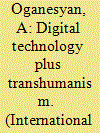

|
|
|
| 4 |
ID:
176472
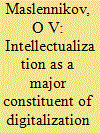

|
|
|
| 5 |
ID:
191127
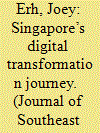

|
|
|
| 6 |
ID:
184022
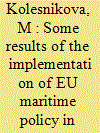

|
|
|
|
|
| Summary/Abstract |
THE EUROPEAN UNION is actively involved in developing the world ocean. Today, it positions itself not only as a consumer of "ocean resources," but also as a leader of sustainable development and a "global actor" playing an independent role in shaping the system of international ocean governance [1]. The EU's strategic maritime interests are multidimensional and primarily associated with ensuring its security [2:1, 2]. Its maritime interests lie at the junction of overlapping areas of activity, including political, economic, functional, sectoral, spatial, and administrative. Therefore, the implementation of its Maritime Policy is of particular importance to the EU.
|
|
|
|
|
|
|
|
|
|
|
|
|
|
|
|
| 7 |
ID:
178090
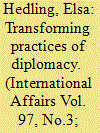

|
|
|
|
|
| Summary/Abstract |
This article explores the transformative role of practices of countering digital disinformation in European Union diplomacy. It argues that an overlooked dimension of the change brought by the rise of digital disinformation is located in the emergence of everyday countering practices. Efforts to counter disinformation have led to the recruitment of new actors with different dispositions and skill sets than those of traditional diplomats and state officials in diplomatic organizations such as the European External Action Service. Focusing on the countering efforts by the East StratCom Task Force, a unit introduced in 2015, the article argues that the composition of actors, the task force's practices and the reorientation in audience perception it reflected, contributed significantly to institutional transformation. Drawing on 23 interviews with key actors and building on recent advancements in international practice theory, the article shows how change and transformation can be studied in practices that have resulted from digitalization in international politics. The article thus contributes to an increased understanding of the digitalization of diplomacy in which new practices can emerge from both deliberate reflection and experimentation.
|
|
|
|
|
|
|
|
|
|
|
|
|
|
|
|
|
|
|
|
|